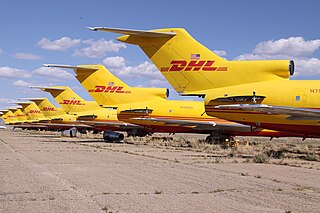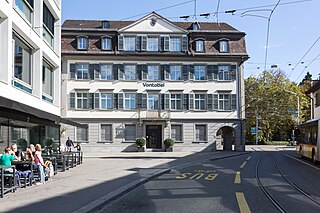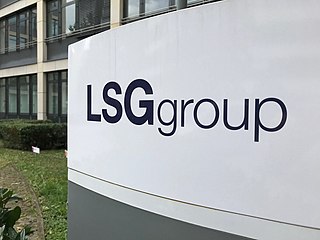
DHL is an American-founded German logistics company providing courier, package delivery and express mail service, delivering over 1.8 billion parcels per year. A subsidiary of the German logistics firm DHL Group, its express mail service DHL Express is one of the market leaders for parcel services in Europe and Germany's main courier and parcel service.
Reichspost was the name of the postal service of Germany from 1866 to 1945.

Postbank is the retail banking division of Deutsche Bank, which was formed from the demerger of the postal savings division of Deutsche Bundespost in 1990. Since May 2018, it operates as a brand of Deutsche Bank's retail arm. It serves 13 million customers in around 1,000 branches and 700 advisory centers.
Ringier AG is a media group in Switzerland, founded in 1833 in Zofingen and based in Zürich. The current strategy is based not only on media but also on e-commerce and entertainment. It has a yearly income of approximately 1000 million CHF and around 6,400 employees in nineteen countries.
A postbus is a public bus service that is operated as part of local mail delivery as a means of providing public transport in rural areas with lower levels of patronage, where a normal bus service would be uneconomic or inefficient. Postbus services are generally run by a public postal delivery company and combine the functions of public transport and mail delivery and collection. A standard passenger fare is payable to the driver or mail carrier.

Mannesmann was a German industrial conglomerate. It was originally established as a manufacturer of steel pipes in 1890 under the name "Deutsch-Österreichische Mannesmannröhren-Werke AG". In the twentieth century, Mannesmann's product range grew and the company expanded into numerous sectors; starting from various steel products and trading to mechanical and electrical engineering, automotive and telecommunications. From 1955, the conglomerate's management holding with headquarters in Düsseldorf was named Mannesmann AG.
The Letter Monopoly was a condition created after the German Postgesetz law was changed in 2005–2007 to allow an exclusive license to the German post office, Deutsche Post, for the transport of letters and catalog deliveries of up to 50 grams from the previous 100 grams. This limit only applied to a portion of the postal market in a service industry of some 1,000 providers, but it created a monopoly. The "Letter Monopoly" was often justified by the provision of universal service by the state, but some German cities wanted it to be abolished.

This is a survey of the postage stamps and postal history of Germany and philatelically related areas. The main modern providers of service were the Reichspost (1871–1945), the Deutsche Post under Allied control (1945–1949), the Deutsche Post of the GDR (1949–1990), the Deutsche Bundespost (1949–1995), along with the Deutsche Bundespost Berlin (1949–1990), and are now the Deutsche Post AG.
Fiducia IT AG was a German IT-service provider based in Karlsruhe. In 2015, it merged with the GAD eG to form Fiducia & GAD IT AG.

United Internet AG is a global Internet services company headquartered in Montabaur, Rhineland-Palatinate, Germany. The company is structured in two business areas, Access and Applications, and has a total of 16 brands and numerous subsidiaries. The well-known brands under the umbrella of United Internet AG include 1&1, IONOS, Fasthosts, GMX, WEB.DE and 1&1 Versatel.

DB Netze is a brand of the German national rail holding company Deutsche Bahn (DB). It was formed in December 2007 along with DB Schenker, the logistic department, and DB Bahn, the passenger services arm.

Union Investment is the investment arm of the DZ Bank Group and part of the cooperative financial services network. It was founded in 1956 and is headquartered in Frankfurt.

1&1 AG is a German telecommunications service provider headquartered in Montabaur, Rhineland-Palatinate and listed on the TecDAX. Since 2017, the majority of the company has belonged to United Internet, and offers both mobile and landline services.
Babcock Borsig Service GmbH is the parent company of Babcock Borsig Service Group. BBS GmbH is an international service provider in the energy-producing industry, with around 2,800 employees.
Hermes Europe GmbH is a German delivery company headquartered in Hamburg, owned by the retail company Otto GmbH.

Vontobel Holding AG is a Swiss private banking and investment management group headquartered in Zurich. Established in 1924, as of August 2021, Vontobel has over 2,000 employees across 26 worldwide locations. Vontobel group's core businesses are Wealth Management, Asset Management and Digital Investing, catering to wealthy private clients as well as institutional investors. Among the top tier Swiss banks, Vontobel holds around $300 billion of client assets.

The Süddeutscher Verlag (SV) is a corporate group that has emerged from the Süddeutsche Zeitung.
Talanx is a German multinational financial services company headquartered in Hanover, Germany. Its core businesses include reinsurance, insurance and asset management. Talanx is Germany's third-largest insurance group and one of the major European insurance groups by premium income. The group operates in more than 150 countries.

LSG Group, registered as LSG Lufthansa Service Holding AG, is an aviation services company that manages multiple brands, including LSG Sky Chefs and Retail inMotion. LSG Group is a subsidiary of Deutsche Lufthansa AG. The company's world headquarters is located in Neu-Isenburg, near Frankfurt, Germany. Its North American headquarters is located in Irving, Texas, United States. In February 2018, LSG Sky Chefs co-founded the Airline Catering Association, which is based in Brussels, Belgium.













